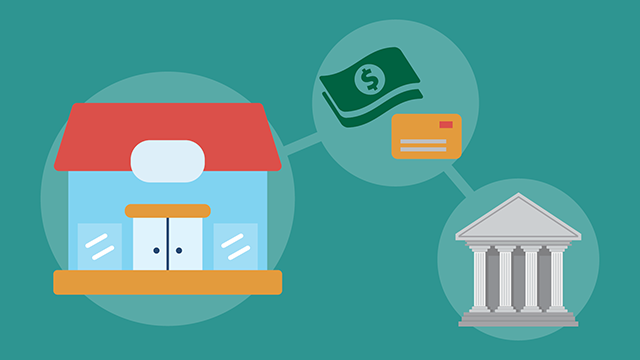A detailed guide to understanding Cash Loans and their benefits
Wiki Article
A Comprehensive Guide to Home Loans: Provider and Options Explained
Charting the world of mortgage can be complex. Various options exist, each with special attributes and effects for potential property owners. Understanding the differences in between traditional and government-backed lendings is crucial. The application procedure entails thorough paperwork and pre-approval actions that many overlook. As debtors start on their home-buying journey, understanding just how to handle these duties efficiently might mean the distinction in between monetary security and difficulty. What strategies can empower them on this path?Recognizing Home Loans: Types and Terms
Recognizing the different sorts of home loans and their associated terminology is necessary for prospective home owners, as it furnishes them with the expertise needed to make informed monetary choices. Home mortgage can be extensively classified into fixed-rate and adjustable-rate home mortgages. Fixed-rate home loans preserve a constant rate of interest over the life of the finance, supplying stability in regular monthly payments. Alternatively, variable-rate mortgages include rate of interest that might rise and fall after an initial set period, possibly causing reduced preliminary settlements yet raised future expenses.Additional terms is important for clarity. Principal refers to the financing amount obtained, while interest is the price of loaning that amount. The regard to the finance suggests its period, generally varying from 15 to three decades. Comprehending these fundamental ideas enables possible purchasers to browse the facility landscape of home financing, guaranteeing they choose the best loan option that aligns with their financial circumstance and long-term goals.
Standard Car Loans vs. Government-Backed Loans
A considerable difference in home funding exists between government-backed car loans and traditional loans, each catering to different borrower requirements and circumstances. Traditional financings are not guaranteed or ensured by the federal government and generally require greater credit report and down settlements. They are commonly attracting borrowers with steady economic backgrounds, as they might use competitive rates of interest and terms.In comparison, government-backed fundings, such as FHA, VA, and USDA fundings, are created to aid specific groups of consumers, consisting of first-time buyers and professionals. These loans usually feature lower deposit requirements and even more versatile credit rating criteria, making them accessible to a wider range of individuals.
Eventually, the option in between government-backed and conventional fundings rests on the debtor's economic circumstance, long-lasting goals, and qualification, making it essential to very carefully assess both choices prior to deciding.
The Function of Passion Prices in Home Financing
Rates of interest play a vital duty in home funding, influencing consumers' decisions in between variable and set price car loans. The choice in between these choices can substantially impact monthly payments, affecting overall affordability. Comprehending how rate of interest operate is vital for anybody steering with the mortgage procedure.Taken Care Of vs. Variable Prices
Homebuyers deal with a necessary decision when selecting in between fixed and variable prices, as this option considerably influences the cost of financing in time. Fixed-rate home mortgages provide stability, securing a rate of interest for the life of the finance, which can be useful in a climbing rate of interest environment. This predictability allows house owners to budget plan extra properly. Alternatively, variable-rate home loans, or variable-rate mortgages (ARMs), generally start with lower first prices that can fluctuate based upon market problems. While this might result in lower preliminary settlements, debtors encounter the threat of increased prices in the future. Ultimately, the option between variable and fixed prices depends on specific monetary situations, threat resistance, and assumptions regarding future passion price fads.Influence On Monthly Payments
When examining home financing alternatives, the effect of rates of interest on month-to-month payments is a crucial factor to contemplate. Interest rates directly influence the overall expense of loaning, influencing just how much a customer will certainly pay each month. A reduced passion rate cause smaller sized monthly repayments, making homeownership much more affordable. On the other hand, higher prices can significantly enhance month-to-month obligations, possibly straining a property owner's spending plan. Additionally, the funding term plays an important duty; longer terms might spread payments out but can bring about paying even more interest gradually - Cash Advance. Understanding how rates of interest engage with car loan quantities and terms is crucial for customers to make enlightened monetary choices and choose a mortgage that aligns with their long-lasting economic goalsMortgage Brokers vs. Straight Lenders: Which Is Right for You?
When thinking about a mortgage, potential debtors have to recognize the distinctive duties and obligations of home mortgage brokers and direct lending institutions. Each choice presents its very own advantages and drawbacks, which can substantially affect the overall price of financing. An informed selection needs mindful analysis of these aspects to establish the very best suitable for individual requirements.Duties and roles Defined
Navigating the intricacies of home funding requires a clear understanding of the roles and duties of mortgage brokers and direct lenders. Cash Loans. Home mortgage brokers serve as intermediaries, attaching borrowers with lenders. They evaluate a consumer's economic circumstance, curate funding choices, and check this guide clients through the application process, commonly leveraging multiple loan provider relationships to secure positive terms. On the other hand, direct lenders, such as financial institutions and cooperative credit union, supply fundings directly to debtors. They deal with the entire finance procedure, from application to financing, with a focus on their own items. Each choice provides distinctive opportunities for acquiring funding, making it vital for consumers to evaluate their needs and preferences when making a decision in between engaging a home mortgage broker or collaborating with a direct lending institutionCons and pros Comparison
Choosing between a home mortgage broker and a direct lender can substantially impact the home financing experience, as each option offers one-of-a-kind benefits and downsides. Home mortgage brokers function as middlemans, offering accessibility to numerous lending institutions and possibly much better prices, while streamlining the car loan procedure. They might bill fees and rely on commission structures that can influence their referrals. On the other hand, direct lending institutions enhance the process by supplying internal financings, which can result in much faster authorizations and fewer difficulties. On the other hand, they might have a limited choice of products and less adaptability regarding prices. Eventually, the choice rests on specific preferences, monetary scenarios, and the preferred level of assistance throughout the home mortgage trip.Expense Ramifications Examined
While examining the cost implications of mortgage brokers versus direct lenders, potential property owners should think about various factors that can significantly impact their general costs. Mortgage brokers normally charge fees for their solutions, which can differ substantially, influencing the general financing expense. They commonly have accessibility to a wider array of loan items and affordable rates, potentially saving customers money in the lengthy run. On the other hand, straight lenders may provide an extra uncomplicated process with potentially lower upfront expenses, yet their financing choices may be limited. It is vital for homeowners to contrast rate of interest rates, fees, and terms from Read More Here both loan providers and brokers, guaranteeing they make an informed decision that lines up with their financial objectives and demands.The Mortgage Application Refine: What to Expect
The home lending application process can commonly really feel daunting for numerous applicants. It generally begins with collecting needed paperwork, including evidence of earnings, credit rating, and individual identification. Lenders use this info to examine the applicant's monetary security and figure out loan eligibility.Next, candidates submit a formal application, which may involve submitting on-line forms or supplying information face to face. Throughout this stage, loan providers assess numerous elements, such as debt-to-income ratio and credit rating, to determine on financing terms.
As soon as pre-approved, the loan provider will conduct a complete evaluation of the residential property to determine its value straightens with the loan amount. This phase may additionally consist of added history checks.
After last authorizations and problems are satisfied, the funding is processed, leading to the closing stage. Recognizing each action equips applicants, making the trip smoother and extra convenient as they move towards homeownership.
Tips for Handling Your Home Finance Responsibly
Successfully maneuvering the mortgage application process is just the start of an accountable monetary trip. Managing a mortgage calls for interest to numerous key methods. Debtors need to develop a clear budget plan that fits monthly home loan repayments, residential or commercial property tax obligations, and insurance. Regularly examining this budget assists stop overspending and warranties prompt settlements.
Additionally, making added payments when possible can considerably minimize the financing principal and complete rate of interest paid over time. Customers need to additionally keep open lines of interaction with their lender, particularly in times of monetary trouble - Installment Loans. This can cause prospective services such as finance modifications or re-financing choices
It is recommended to check credit history scores frequently. A great credit report can supply opportunities for better finance terms in the future. By following these ideas, homeowners can browse their lending responsibilities properly, ensuring long-term financial wellness and stability.
Regularly Asked Inquiries
What Are Closing Costs and Exactly How Are They Determined?
Closing costs incorporate costs connected with settling a home loan, consisting of assessment, title insurance coverage, and loan source fees. These prices usually range from 2% to 5% of the car loan quantity, differing based upon location and lender.
Can I Get Approved For a Home Mortgage With Bad Credit?
Yes, people with bad credit score can receive a mortgage, though choices might be restricted. Lenders typically call for greater deposits or rate of interest rates, and checking out government-backed car loans might boost like this possibilities of authorization.
What Is Home loan Insurance and When Is It Required?
When a debtor makes a down payment of much less than 20%, mortgage insurance secures lenders against default and is normally needed. It ensures that lenders recover losses if the consumer fails to repay the funding.Exactly How Does Refinancing Job and When Should I Consider It?
Refinancing involves replacing an existing mortgage with a brand-new one, generally to secure a lower rate of interest or change lending terms. House owners ought to think about refinancing when rates of interest go down substantially or their monetary circumstance enhances.What Occurs if I Miss a Mortgage Settlement?
If a mortgage payment is missed, the loan provider generally evaluates late charges, reports the misbehavior to credit bureaus, and might launch repossession procedures if payments proceed to be neglected, at some point threatening the property owner's residential property.Fixed-rate home loans maintain a consistent rate of interest rate over the life of the loan, giving stability in monthly payments. A considerable difference in home financing exists in between government-backed loans and standard finances, each catering to different customer requirements and circumstances. In contrast, government-backed lendings, such as FHA, VA, and USDA fundings, are created to assist details groups of customers, including novice homebuyers and veterans. Interest rates play a vital role in home funding, affecting borrowers' choices in between fixed and variable price financings. Fixed-rate home loans use stability, securing in a rate of interest price for the life of the financing, which can be useful in an increasing rate of interest rate environment.
Report this wiki page